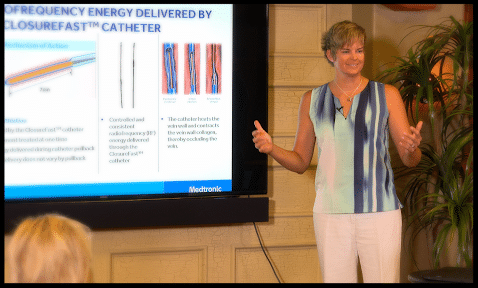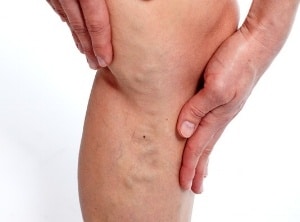
Vaginal Varicose Veins – Is that even a thing?
If you have even heard of vulvar varicosities, chances are it is because you have experienced them. And it is likely you had to work ridiculously hard to uncover any information about the topic. Varicose veins of the vulva and perineum just don’t get a whole lot of press. Commonly quoted estimates state that about 10 percent of women will experience vulvar varicosities during pregnancy, but it is possible that number is higher because some women just won’t talk about it.
And if you look at the rare online discussion about vaginal varicose veins, like JustMommies.com you will see that women who experience the symptoms of vulvar varicosities are completely surprised when it happens—because they had no idea such a thing could even happen.
Let’s change that!
Let’s get women the information they need to live more comfortable, more present lives. Let’s start talking about it. Let’s take it from being a thing to just being, you know, a thing. If we need to, let’s talk to our sisters, our girlfriends, our wives, our mothers. And, if you have any questions about this or any other vein issue, another great person to talk to is a qualified vein specialist.
Vulvar varicosities: But Why?!
Basically, it is possible to develop a varicosity in any part of the body. But there are a few reasons why your vulvar area can be susceptible.
- Gravity. Baby and placenta put a lot of pressure on the pelvic region, and this creates back pressure on the veins in the pelvic floor.
- Hormones. The pregnancy hormones that are circulating to prepare your pelvis for birth also make your veins—all of your veins—prone to distension. Estrogen, progesterone and relaxing all play a part.
- Mechanics. The venous valves that are designed to provide some protection against pooling of blood in lower regions occur less frequently the closer the vein is to the heart. In a small percentage of women, there are no venous valves in the vulvar area.
Some Good News About Vaginal Varicose Veins (and a Little Bad News-but Mostly Good)
Let’s start with the good...
- Good news—they are transient. Chances are good that they will go away once baby is born.
- Bad news—they are transient. If you get them once, vulvar varicosities will come back—and likely sooner—with each subsequent pregnancy. As well, with each pregnancy, there is an increasing chance that they will stay, even after the baby is born.
- Bad news—they could be a sign of more ominous things. It is possible that vulvar varicosities are a sign that you have developed, or are developing, Chronic Venous Insufficiency (CVI), especially if they appear with varicose veins in your legs. A qualified vein specialist can look at your veins and tell you if this is the case for you.
Here's the Really Good News
The really good news, though, is that if varicosities do appear during pregnancy, and don’t go away once baby is born, there are vulvar varicosity treatments available that can get you back to feeling like your old self with minimal fuss. A qualified vein specialist like Dr. Jilanne Rose from Advanced Vein Institute of Arizona (AVIA) will be happy to talk to you about your options. However, as she wants you to have the most successful experience possible, she will caution you about the timing of treatments.
“One thing to keep in mind is that if you are currently or recently pregnant, you will have to wait a bit before a vein specialist can treat you,” Dr. Rose says. “Birth will relieve much of the pressure on the area. However, your body will need some time—at least a few months—for hormone levels to return to normal and for your body to re-adjust. In the end, you might not even need treatment.”
While you wait, Jilanne has a few suggestions you can try to find some temporary relief from the symptoms of vulvar varicosities.
More good news: it is really easy to talk to Jilanne. Call the office or fill out this form if you would like to get a conversation started about whether vein treatment is what you need to get back to living more comfortably.
Is there anything worse than itchy varicose veins? Maybe, but itchy veins remains high on the list of issues we would love to resolve before they drive us crazy. If you are experiencing itching around your varicose veins, it could be a message from your body that it is time to have your veins checked…
Read MoreThe full story on Chronic Venous Insufficiency, what it is and how to treat it. A video presentation by Jilanne Rose, DNP-C, Clinical Director. Run Time 24:46. TRANSCRIPT What’s the Difference Between Veins and Arteries? When we talk about vascular health and vascular disease most people think about arteries. When we talk about the…
Read MoreA group of Gilbert Arizona Residents concerned about Chronic Venous Insufficiency gathered on Saturday July 16th for an interactive discussion on CVI symptoms, causes and treatments. Chronic Venous Insufficiency, Venous Reflux Disease and Varicose Veins affect over 30 million American men and women. Unfortunately, many do not get treated as they believe varicose veins are…
Read MoreCan Chronic Venous Insufficiency (CVI) be reversed? Unfortunately the short answer to this question is no; but CVI can be treated with minimally invasive procedures which can reduce symptoms and improve quality of life tremendously! Chronic Vein Insufficiency Causes In order to understand why venous insufficiency or peripheral venous insufficiency cannot be reversed, we must…
Read MoreWhat can you do to treat bleeding varicose vein and spider veins? First and foremost, don’t panic. Although the visual effect of a ruptured varicose vein or bleeding vein can be alarming, there are some simple things that can be done to get the bleeding to stop. If you can reach the area that is…
Read MoreWhy are varicose veins painful? The discomfort associated with varicose veins is caused by a combination of factors. When veins are weak, the blood which is supposed to return to the heart in a timely fashion, settles and pools in the superficial vein system. This pooling of blood worsens when patients stand or sit in…
Read MoreEndovenous Ablation Definition Taken literally, endovenous ablation is the removal of a vein from within. ‘Endo’ means internal or inside, ‘venous’ refers to a vein, and ablation is to ‘remove’. In the instance of veins, it is no longer necessary to physically remove a vein from the leg (vein stripping) to improve symptoms or the…
Read MoreThe newest procedure for the treatment of varicose veins was approved by the FDA about two years ago. It is what has been termed a non-tumescent non-thermal therapy. What this means is that it does not require a lot of numbing medicine to complete, and it does not use a heating element to close or…
Read MoreWhat is the best treatment for varicose veins? No varicose vein is the same; no person’s symptoms are the same; and so the best procedure for varicose veins is not always the same. The treatments associated with vein disease are based on a patient’s symptoms, vein size, location, contributing conditions, and ultrasound findings. Different…
Read More

